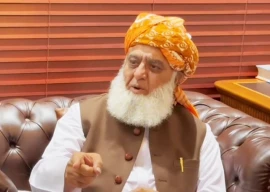
The Senate on Friday referred the Pakistan Electronic Media Regulatory Authority (Amendment) Bill, 2023, to the relevant standing committee of the Senate for further refinement and improvement in response to the concerns raised by the senators.
Under the bill, the powers of the regulatory authority’s chief have been given to the Council of Complaints.
The amended PEMRA bill, drafted after in-depth debate and consultations with all the stakeholders and presented by Minister for Information and Broadcasting Marriyum Aurangzeb, has already been passed by the National Assembly.
However, the government’s move has raised concerns among broadcasters who have emphasised that the powers to monitor rating agencies should be granted to advertisers instead.
Speaking on the floor, the minister said the government's extensive consultations on the bill lasted 12 months, adding that the discussions involving definitions of information and disinformation alone took up a significant 11-month period.
She clarified that the newly proposed amendments bring about significant changes, notably in raising fines for violations. She criticised the existing law, stating that its definitions were "draconian," whereas the new bill allows for more flexibility and understanding of potential errors.
Another key aspect of the amendments is the increased authority given to the authority Previously, the power to shut down channels rested with the chairman of Pemra, but under the proposed changes, this would now be vested in the regulatory authority itself.
The bill also addresses the issue of payments to journalists. The government has included a two-month time period for the payment of minimum wages and arrears to journalists. Non-compliance with these regulations would result in stringent penalties being imposed.
The minister also touched upon the regulation of digital platforms. According to the proposed amendments, these platforms would be limited to running content that has already been aired on television. Additionally, a noteworthy 10% of the content on these platforms would comprise "public service messages."
Also read: NA passes bill to 'end FATF threat forever'
The draft of the bill states that “disinformation means verifiably false, misleading, manipulated, created or fabricated information which is disseminated or shared with the intention to cause harm to the reputation of or to harass any person for political, personal, or financial interest or gains without making an effort to get other person’s point of view or not giving it proper coverage and space, but does not include misinformation”.
The bill also states that “misinformation means verifiable false content or information that is unintentionally disseminated or shared”.
It also authorises Pemra to impose a fine of up to Rs1 million on a licensee who “contravenes any of the provisions of this ordinance or the rules or regulations of the code of conduct or terms and conditions of the licence” after giving them a reasonable opportunity to show cause.
Bill to combat terror-financing, money laundering
Another crucial bill aiming to keep Pakistan off the Financial Action Task Force's (FATF) grey list, was also passed by the upper house to establish a new authority to combat the grave issues of money laundering and terrorism financing.
It is noteworthy that this legislation had been hastily rushed through the National Assembly merely a day before.
The bill, titled the "National Anti-Money Laundering and Counter Financing of Terrorism Authority Bill," was introduced in the upper house by State Minister for Foreign Affairs Hina Rabbani Khar.
The bill outlines the structure and responsibilities of the proposed authority.
The proposed authority will be headed by a chairman and will consist of the federal secretaries for finance, foreign affairs and interior; the State Bank of Pakistan governor; chairpersons of the Securities and Exchange Commission of Pakistan, National Accountability Bureau, and Federal Board of Revenue; directors general of the Federal Investigation Agency, Anti Narcotics Force and Financial Monitoring Unit; national coordinator of the National Counter Terrorism Authority (Nacta); and chief secretaries of all four provinces, Azad Kashmir and Gilgit-Baltistan.
According to the new legislation, the proposed authority can convene meetings on the requisition of the chairman or half of its members.
As per the objectives of the draft bill, Pakistan is required to cooperate with international organisations “for anti-money laundering, countering financing of terrorism and targeted financial sanctions by way of promulgating requisite legal and regulatory framework.”
Khar, after tabling the bill, tried to clarify its purpose, saying the legislation's title seemed "dangerous" and sought to shed light on its true intentions.
According to Khar, the bill is, in fact, a crucial step taken by the government to ensure the continuation of the country's remarkable efforts in moving away from the Financial Action Task Force (FATF) grey list. She emphasised the need for institutionalised measures to maintain the progress achieved thus far.
She explained that the task force was established in 1989 by the G7 countries, primarily to combat money laundering. However, she highlighted that in 2001, the mandate was expanded to include the critical aspect of countering terrorist financing.
The legislation aims to streamline and strengthen efforts to combat money laundering and terrorism financing, aligning the country's practices with international standards and commitments, Khar added.
The monitoring of money laundering and terror financing, she continued, could not be confined to one area. She said that the financial monitoring unit was set up under the Ministry of Finance while Nacta was also set up.
Khar said that the authority will ensure that it is able to bring all the work that is happening within the government of Pakistan and the provinces in one place so that “we can monitor our progress, and if there are any loopholes, we can connect them and stop them before we run into serious problems”.
The state minister went on to request the House to pass the bill as “quickly as possible”.
Meanwhile, the government's whirlwind of legislation persisted with the Senate going ahead and approving contentious several bills, evoking opposition even from its own ranks.
Lawmakers encircled the chairman's podium to protest against certain bills that were presented for approval allegedly without due consideration and thorough examination of their contents.
The upper house of the Parliament also passed 14 bills, including the Gas (Theft Control and Recovery) Bill, 2023 introduced by Minister for Energy, Khurram Dastgir Khan; The Federal Urdu University of Arts, Sciences, and Technology, Islamabad (Amendment) Bill, 2023 presented by Minister for Finance and Revenue Ishaq Dar; The National Skills University Islamabad (Amendment) Bill, 2023 also moved Dar; the Imports and Exports (Control) (Amendment) Bill, 2023, presented by Minister for Law and Justice Azam Nazir Tarar.
Similarly, the law minister also tabled the Trade Marks (Amendment) Bill, 2023.
The Press Council of Pakistan (Amendment) Bill, 2023 was presented by Information Minister Marriyum Aurangzeb.
However, for the passage of the bill, the chairman had to order a count. The outcome of the count showed that 16 senators voted in favour of the bill, while nine opposed it.
1724760612-0/Untitled-design-(12)1724760612-0-405x300.webp)
















COMMENTS
Comments are moderated and generally will be posted if they are on-topic and not abusive.
For more information, please see our Comments FAQ